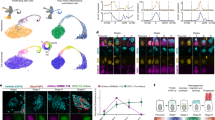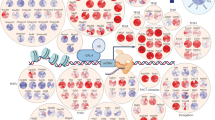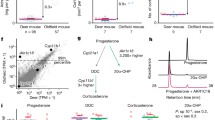Abstract
IT is known that the metabolism of the non-histone, acidic proteins associated with DNA in the chromatin of animal cells is influenced by steroid hormones. The effects are often highly specific; for example, the administration of hydrocortisone to adrenalectomized rats leads to a selective stimulation of synthesis of a liver chromosomal protein of molecular weight 41,0001. Hydrocortisone also alters the pattern of phosphorylation of chromosomal proteins in the liver, differential effects becoming evident within minutes after injection of the hormone2,3. Similar specific alterations in the synthesis or phosphorylation of nuclear proteins have been observed in uterine cells responding to oestrogens4, in kidney cells following aldosterone administration (C. Liew, personal communication), in prostate cells stimulated by androgens5, and in insect chromosomes stimulated by ecdysone6. In all these cases, the steroid hormone also affects the RNA synthetic capacity of the target cells, presumably as a result of altered template capacity of the modified chromatin.
This is a preview of subscription content, access via your institution
Access options
Subscribe to this journal
Receive 51 print issues and online access
$199.00 per year
only $3.90 per issue
Buy this article
- Purchase on Springer Link
- Instant access to full article PDF
Prices may be subject to local taxes which are calculated during checkout
Similar content being viewed by others
References
Shelton, K. R., and Allfrey, V. G., Nature, 228, 132 (1970).
Allfrey, V. G., Teng, C. S., and Teng, C. T., in Nucleic Acid–Protein Interactions–Nucleic Acid Synthesis in Viral Infection (edit. by Ribbons, D. W., Woessner, J. F., and Schultz, J.), 144 (North Holland Publishing Company, Amsterdam, London, 1971).
Teng, C. S., Teng, C. T., and Allfrey, V. G., Arch. Biochem. Biophys (in the press).
Teng, C. S., and Hamilton, T. H., Biochem. Biophys. Res. Commun., 40, 1231 (1970).
Ahmed, K., Biochim. Biophys. Acta, 243, 38 (1971).
Helmsing, P. J., and Berendes, H. D., J. Cell Biol., 50, 893 (1971).
Holton, D., and Kenney, F. T., J. Biol. Chem., 242, 4372 (1967).
Jost, J.-P., Khairallah, E. A., and Pitot, H. C., J. Biol. Chem., 243, 3057 (1968).
Teng, C. S., Teng, C. T., and Allfrey, V. G., J. Biol. Chem., 246, 3597 (1971).
Sutherland, E. W., and Rall, T. W., Pharmacol. Rev., 12, 265 (1960).
Sutherland, E. W., Robison, G. A., and Butcher, R. W., Circulation, 37, 279 (1968).
Exton, J. H., and Park, C. R., Pharmacol. Rev., 18, 181 (1966).
Johnson, E. M., and Allfrey, V. G., Arch. Biochem. Biophys., 152, 786 (1972).
Author information
Authors and Affiliations
Rights and permissions
About this article
Cite this article
ENEA, V., ALLFREY, V. Selective Synthesis of Liver Nuclear Acidic Proteins following Glucagon Administration in vivo. Nature 242, 265–267 (1973). https://doi.org/10.1038/242265b0
Received:
Revised:
Issue Date:
DOI: https://doi.org/10.1038/242265b0
Comments
By submitting a comment you agree to abide by our Terms and Community Guidelines. If you find something abusive or that does not comply with our terms or guidelines please flag it as inappropriate.



